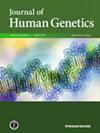在日本一项基于人群的队列研究中,向参与者返回遗传性癌症的遗传风险信息。
IF 2.5
3区 生物学
Q2 GENETICS & HEREDITY
引用次数: 0
摘要
收集基因组信息的大规模人群队列研究的任务是将遗传癌症的遗传风险评估反馈给参与者。虽然有几项研究已经申请将确定的遗传风险反馈给参与者,但对参与者对癌症风险的理解、感受和行为的全面调查仍有待进行。在这里,我们报告了我们的经验和调查,通过对来自Tohoku Medical Megabank项目(一项人口队列研究)的5万人进行全基因组测序,确定了100名遗传性癌症致病变异携带者的遗传风险。参与者是与遗传性乳腺癌和卵巢癌(n = 79,中位年龄=41)或Lynch综合征(n = 21,中位年龄=62)相关的致病变异携带者。其中,分别有28%和38%的人有癌症病史。我们亲自向参与者提供有关癌症风险、遗传性和临床可操作性的信息。理解力评估显示,年轻女性(60岁以下)比年长男性更能理解信息。癌症担忧量表的得分与癌症经历和一般心理困扰呈正相关。71名参与者在东北大学医院接受了随访;6名女性因参与研究而接受了降低风险的手术,3名女性在监测期间新诊断出癌症。在遗传性乳腺癌和卵巢癌携带者的一级亲属中,参与者最常与女儿分享信息。这项研究显示了将遗传风险返还给普通人群的好处,并将在临床和研究环境中为将遗传风险返还给无症状致病变异携带者提供见解。本文章由计算机程序翻译,如有差异,请以英文原文为准。

Returning genetic risk information for hereditary cancers to participants in a population-based cohort study in Japan
Large-scale population cohort studies that collect genomic information are tasked with returning an assessment of genetic risk for hereditary cancers to participants. While several studies have applied to return identified genetic risks to participants, comprehensive surveys of participants’ understanding, feelings, and behaviors toward cancer risk remain to be conducted. Here, we report our experience and surveys of returning genetic risks to 100 carriers of pathogenic variants for hereditary cancers identified through whole genome sequencing of 50 000 individuals from the Tohoku Medical Megabank project, a population cohort study. The participants were carriers of pathogenic variants associated with either hereditary breast and ovarian cancer (n = 79, median age=41) or Lynch syndrome (n = 21, median age=62). Of these, 28% and 38% had a history of cancer, respectively. We provided information on cancer risk, heritability, and clinical actionability to the participants in person. The comprehension assessment revealed that the information was better understood by younger (under 60 years) females than by older males. Scores on the cancer worry scale were positively related to cancer experiences and general psychological distress. Seventy-one participants were followed up at Tohoku University Hospital; six females underwent risk-reducing surgery triggered by study participation and three were newly diagnosed with cancer during surveillance. Among first-degree relatives of hereditary breast and ovarian cancer carriers, participants most commonly shared the information with daughters. This study showed the benefits of returning genetic risks to the general population and will provide insights into returning genetic risks to asymptomatic pathogenic variant carriers in both clinical and research settings.
求助全文
通过发布文献求助,成功后即可免费获取论文全文。
去求助
来源期刊

Journal of Human Genetics
生物-遗传学
CiteScore
7.20
自引率
0.00%
发文量
101
审稿时长
4-8 weeks
期刊介绍:
The Journal of Human Genetics is an international journal publishing articles on human genetics, including medical genetics and human genome analysis. It covers all aspects of human genetics, including molecular genetics, clinical genetics, behavioral genetics, immunogenetics, pharmacogenomics, population genetics, functional genomics, epigenetics, genetic counseling and gene therapy.
Articles on the following areas are especially welcome: genetic factors of monogenic and complex disorders, genome-wide association studies, genetic epidemiology, cancer genetics, personal genomics, genotype-phenotype relationships and genome diversity.
 求助内容:
求助内容: 应助结果提醒方式:
应助结果提醒方式:


